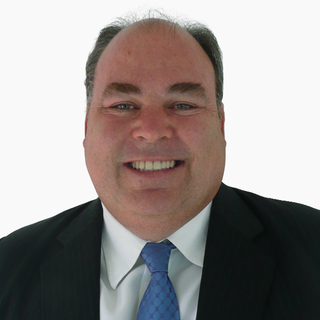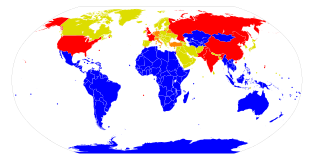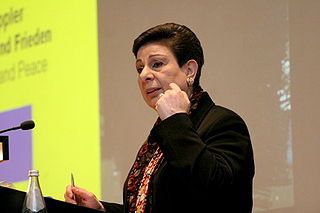The topic of this article may not meet Wikipedia's notability guideline for biographies .(November 2016) |
Randa Slim is a Lebanese-American foreign-policy professional specializing in Track II diplomacy.
The topic of this article may not meet Wikipedia's notability guideline for biographies .(November 2016) |
Randa Slim is a Lebanese-American foreign-policy professional specializing in Track II diplomacy.
Slim is founding director of the Initiative for Track II Dialogues at the Middle East Institute [1] as well as a senior research fellow at the Johns Hopkins School of Advanced International Studies' Foreign Policy Institute [2] and the New America Foundation. [3] [4]
She has said that her interest in Track II diplomacy — so-called to distinguish conflict-resolution conversations that are not part of official Track I talks — came from her experiences as a girl during the Lebanese Civil War. [5]
From 1991 to 2000, Slim worked at the Kettering Foundation on the Dartmouth Conferences, [6] confidential U.S.-Soviet, then U.S.-Russian, discussions that began in 1961 at Dartmouth College. [7] She was part of the multi-year Inter-Tajik Dialogue. [8]
After the September 11 attacks on New York City and Washington, D.C., Slim decided to become involved in Track II diplomacy in the Middle East. She worked on an Iraqi national reconciliation dialogue involving Iraqi parliamentarians, tribal leaders and representatives of Iraqi opposition groups. [4] After the Syrian civil war broke out in 2011, Slim initiated Track II diplomacy aimed at resolving the conflict. [9] She particularly emphasized making women part of the conflict-resolution dialogue. [10]
The BBC's Kim Ghattas wrote in Foreign Policy , "The sessions organized by Slim continue, and they stand out because unlike most 'Track II' dialogues, which include only former officials and experts, these include advisors and aides to current officials. Both Saudis and Iranians have attended all the sessions." [9] As director of the Middle East Institute's Initiative for Track II Dialogues, [11] Slim seeks to extend non-official talks to help resolve conflicts across the region. [12]
Abdul Aziz Said was Professor Emeritus of International Relations in the School of International Service at American University, Washington, D.C., and founding Director of the university's International Peace and Conflict Resolution Division. Said was well known for helping shift the focus of International Relations theory from real politic-based on the concept that the law of power governs states, to new world order-based on cooperation and common security. Starting in the 1990s Said focused his work on peace and conflict resolution and later explored the relationship between spirituality and religion in international politics.
Track II diplomacy or "backchannel diplomacy" is the practice of "non-governmental, informal and unofficial contacts and activities between private citizens or groups of individuals, sometimes called 'non-state actors'". It contrasts with track I diplomacy, which is official, governmental diplomacy that occur inside official government channels. However, track two diplomacy is not a substitute replacement for track one diplomacy. Rather, it is there to assist official actors to manage and resolve conflicts by exploring possible solutions derived from the public view and without the requirements of formal negotiation or bargaining for advantage. In addition, the term track 1.5 diplomacy is used by some analysts to define a situation where official and non-official actors cooperate in conflict resolution.

The Greater Middle East is a political term introduced in March 2004 in a paper published by the Carnegie Endowment for International Peace as part of the U.S. administration's preparatory work for the Group of Eight summit of June 2004. The area denotes a vaguely defined region called the "Arab world" together with Afghanistan, Iran, Israel, Turkey, and several other neighboring countries that have cultural or religious ties. The paper presented a proposal for sweeping change in the way the West deals with the Middle East and North Africa.

Martin Sean Indyk is an American diplomat and foreign relations analyst with expertise in the Middle East. He was a distinguished fellow in International Diplomacy and later executive vice president at the Brookings Institution in Washington, D.C from 2001-2018. He took leave from the Brookings Institution to serve as the U.S. Special Envoy for Israeli–Palestinian Negotiations from 2013 to 2014. He is currently a distinguished fellow at the Council on Foreign Relations.

The Centre for Humanitarian Dialogue (HD), otherwise known as the Henry Dunant Centre for Humanitarian Dialogue, works to prevent and resolve armed conflicts around the world through mediation and discreet diplomacy. A non-profit organisation based in Switzerland, HD was founded in 1999 on the principles of humanity, impartiality and independence. HD is supervised by an independent board, regularly reports to donors and undergoes financial audits every year.

Carey Edward Cavanaugh is a former U.S. Ambassador/peace mediator and chairman of International Alert, a London-based independent peacebuilding organization. He is currently professor of diplomacy at the University of Kentucky.
Oxford Research Group (ORG) was a London-based charity and think tank at 244–254 Cambridge Heath Road, London, E2 9DA, working on peace, security and justice issues. Its research and dialogue activities were mainly focused on the Middle East, North and West Africa, as well as influencing UK and international security policy.

The Dartmouth Conference is the longest continuous bilateral dialogue between American and Soviet representatives. The first Dartmouth Conference took place at Dartmouth College in 1961. Subsequent conferences were held through 1990. They were revived in 2014 and continue today. Task forces begun under the auspices of the main conference continued to work after the main conference stopped. The Regional Conflicts Task Force extended the sustained dialogue model, based on the Dartmouth experience, to conflicts in Tajikistan and Nagorno-Karabakh. Dartmouth inspired a number of other dialogues in the former Soviet Union and elsewhere, many of them under the auspices of the Sustained Dialogue Institute and the Kettering Foundation.
Helena Cobban is a British-American writer and researcher on international relations, with special interests in the Middle East, the international system, and transitional justice. She is a non-resident Senior fellow at the Washington DC-based Center for International Policy. She is the founder and CEO of the book-publishing company, Just World Books and the Executive President of the small educational non-profit organization, Just World Educational. Having contributed throughout her career to numerous media outlets and authored seven books, she resumed her writing career in 2019.
Harold Henry Saunders served as the United States Assistant Secretary of State for Intelligence and Research between 1975 and 1978 and United States Assistant Secretary of State for Near East Affairs between 1978 and 1981. Saunders was a key participant in the Camp David Accords, helped negotiate the Iran Hostage Crisis, and developed the sustained dialogue model for resolving conflicts Saunders later launched the Sustained Dialogue Institute, which uses the sustained dialogue model to address racial and other issues in the United States and abroad.
The Kettering Foundation is an American non-partisan research foundation founded in 1927 by Charles F. Kettering. The foundation publishes books and periodicals, employs research fellows, and organizes public forums on policy in order to answer the question: "what does it take for democracy to work as it should?" It is based in Dayton, Ohio.

The EastWest Institute (EWI), originally known as the Institute for East-West Security Studies and officially the Institute for EastWest Studies, Inc., was an international not-for-profit, non-partisan think tank focused on international conflict resolution through a variety of means, including track 2 diplomacy and track 1.5 diplomacy, hosting international conferences, and authoring publications on international security issues. EWI employed networks in political, military, and business establishments in the United States, Europe, and the former Soviet Union.
Science diplomacy is the use of scientific collaborations among nations to address common problems and to build constructive international partnerships. Science diplomacy is a form of new diplomacy and has become an umbrella term to describe a number of formal or informal technical, research-based, academic or engineering exchanges, within the general field of international relations and the emerging field of global policy making.

The Middle East nuclear weapon free zone (MENWFZ) is a proposed agreement similar to other nuclear-weapon-free zones. Steps towards the establishment of such a zone began in the 1960s led to a joint declaration by Egypt and Iran in 1974 which resulted in a General Assembly resolution. Following the 1995 NPT Review Conference, the International Atomic Energy Agency (IAEA) held a series of meetings involving experts and academics to consider ways to advance this process.

Randa Kassis is a Franco-Syrian politician and a leading secular figure of the Syrian opposition. She was the President of The Astana Platform of the Syrian opposition and the founder of the Movement of the Pluralistic Society.

Hanan Daoud Mikhael Ashrawi is a Palestinian politician, activist, and scholar.

The Madrid Conference of 1991 was a peace conference, held from 30 October to 1 November 1991 in Madrid, hosted by Spain and co-sponsored by the United States and the Soviet Union. It was an attempt by the international community to revive the Israeli–Palestinian peace process through negotiations, involving Israel and the Palestinians as well as Arab countries, including Jordan, Lebanon and Syria.

The Sustained Dialogue Institute, founded by Harold H. Saunders and incorporated in 2002, is an independent tax-exempt 501 (c)(3) organization formed in collaboration with the Kettering Foundation. The institute provides trainings, consulting, and technical support for the Sustained Dialogue process on campuses, workplaces, and communities around the globe. Sustained Dialogue is system for transforming conflictual or destructive relationships, and implementing long-term change, developed from Hal Saunders' experience facilitating peace processes in the Middle East as a United States diplomat.
Peacebuilding in Jammu and Kashmir includes confidence-building measures at a nation-state level between the governments of India and Pakistan, track two diplomacy, as well as initiatives by non-governmental organisations (NGOs), institutes and individuals. The purpose of peacebuilding in Jammu and Kashmir include conflict prevention and reduction of hostilities in the Kashmir Valley. Many countries such as Russia, United States and China have also played a de-escalatory role with regard to tensions in the region.
Suzanne DiMaggio is long-time analyst of U.S. Foreign Policy in Asia and the Middle East and a leading practitioner of Track II diplomacy. Her work is especially focused on U.S. relations with Iran and North Korea.